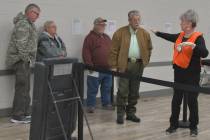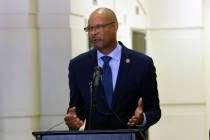That history book on the shelf
In the early days of Nevada, the state’s history was written mostly by clubwomen rather than by trained historians.
By some accounts Nevada did not get its first professional historian until the 1950s with the arrival of Russell Elliott.
The result was a history that was cleansed and oriented to community leaders and business. It was a narrow telling. The rich history of the immigrant groups who made up so much of the state’s population, for instance, got short shrift.
The nation fared better, but our national history has always been filtered to de-emphasize things like disreputable government actions (the Philippine conquest) and infamous grass roots activity (lynchings, by hanging or burning at the stake or dismemberment).
As a result, the public’s ignorance of our nuanced history is nearly complete. We hit the high points in history classes and stop there. This is unfortunate, because current events keep offering opportunities for us to learn from history, if only we knew it.
In January, the federal government sold off a patch of land in Wyoming known as Teapot Dome. During the presidential administration of Warren Harding, oil leases from naval oil reserves were let for “gifts” and “loans” to Harding cabinet member Albert Fall worth about $400,000 (about $5,234,839.36 in 2014 dollars). I put those words in quotation marks in the same way we should always put “campaign contribution” in quotation marks today.
We know very little about Teapot Dome from our history classes, which is unfortunate. Today “campaign contributions” are institutionalized as a part of the electoral system, even though we can’t slide a razor blade into the moral difference between them and bribes.
Here’s another example; Last month Wisconsin Gov. Scott Walker tried to remove the phrase “search for truth” from the mission statement of the University of Wisconsin.
This would be bad enough in any state. But this is Wisconsin. In 1894, UW economist Richard T. Ely was haled before the Board of Regents on academic charges.
Ely, though a critic of socialism and a target of disdain by socialists, believed in teaching his students about all economic systems, including capitalism and socialism. The state school superintendent made accusations that were investigated by the regents.
Committees do not often produce great literature, but their statement exonerating Ely falls in that category:
“[W]e could not for a moment think of recommending the dismissal or even the criticism of a teacher even if some of his opinions should, in some quarters, be regarded as visionary. Such a course would be equivalent to saying that no professor should teach anything which is not accepted by everybody as true … Whatever may be the limitations which trammel inquiry elsewhere, we believe the great state University of Wisconsin should ever encourage that continual and fearless sifting and winnowing by which alone the truth can be found.”
This statement became known as the Magna Carta of academic freedom.
A few days ago, a pharmacist said to me, “Boy, someone should do an investigation of those pharmaceutical companies.”
I reminded him of the 1959 investigation by a U.S. Senate committee headed by Sen. Estes Kefauver that found outrageous markups of prescription drugs – 7,000 percent, in one case – an investigation that is now largely forgotten.
In October when Nevada began its 150th year, I published an account of the treatment of Great Basin tribes that took some people by surprise, given the highly sanitized version of our Nevada history taught in schools.
At the current session of the Nevada Legislature, Clark County Sen. Richard Segerblom has a measure, Senate Bill 211, to require enhanced instruction in the role of ethnic groups and ethnic culture.
To be sure, legislation is not a great way to deal with curriculum (much less including that language in the same bill with a provision for a longer school day), but Nevada already has at least 10 statutes mandating instruction in various fields of study, including the “economics of the American system of free enterprise.”
Segerblom’s bill is certainly better than a measure that passed in Arizona, where lawmakers banned ethnic studies entirely in order to prevent the teaching of one kind of ethnic culture – that of Latinos, who make up half the student population.
Dennis Myers is an award winning journalist who has reported on Nevada’s capital, government and politics for several decades. He has also served as Nevada’s chief deputy secretary of state.
















